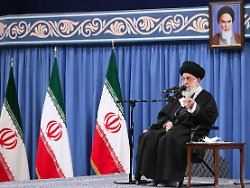Monday, February 22, 2021
Ayatollah railed against arrogance
Tehran's hardliners disapprove of the nuclear deal
After the change of power in the White House, there is hope of reviving the nuclear treaty with Iran. Literally at the last second, the UN Atomic Energy Agency closes a stripped-down deal that is supposed to buy all sides time. But that goes down badly with the hardliners in Tehran's parliament.
Iran's agreement with the UN Atomic Energy Agency [IAEA] to continue cooperation has led to protests from hardliners and government opponents in the Iranian parliament. According to the Tasnim news agency, the planned meeting on the budget for the new Persian year – from March 21 – was suspended and a closed session was called. The new agreement with the IAEA is to be examined.
IAEA chief Rafael Grossi received a promise from Iranian nuclear chief Ali Akbar Salehi on Sunday in Tehran that the IAEA could continue its controls of the Iranian nuclear program for three months at least to a limited extent. The inspectors did not have the same extensive access as before, but he expected that they could do their job, said Grossi on his return to Vienna. The controls are designed to ensure that the Iranian nuclear program is only for civilian purposes. The IAEA hopes to find a more far-reaching solution within three months.
According to some hardliners, the deal is inconsistent with Iran's Atomic Energy Act, which was passed in November 2020. Foreign Office spokesman Said Chatibsadeh defended the deal and opposed the fact that cooperation with the IAEA would be restricted from Tuesday. The video material from the IAEA surveillance cameras was also confiscated for three months. "Everything under the new Atomic Energy Act," said the spokesman.
Restrictions on inspectors and video material
The Iranian nuclear organization AEOI stated, as ordered by parliament, that from Tuesday, Iran would no longer work with the IAEA within the framework of the IAEA additional protocol, but only on the basis of the Nuclear Non-Proliferation Treaty. As a result, there will be restrictions on inspections of the facilities. The AEOI also confirmed that the IAEA would no longer have access to video footage from its surveillance cameras for the next three months. If a political agreement is reached during this time, the IAEA will also receive the videos. If not, they would be deleted. According to the AEOI, an agreement must primarily include the lifting of US sanctions.
The 2015 Vienna nuclear deal between Tehran, the five UN veto powers and Germany was supposed to prevent Iran from building a nuclear weapon. In return, the sanctions against Tehran should be lifted. However, under President Donald Trump, the United States got out of the deal in 2018 and again imposed sanctions to bring down Iran economically. Because the other partners of the agreement actually also adhered to the US sanctions, since May 2019 Iran has been step by step distance from the agreement and is increasingly no longer complying with agreements. Iran is mainly concerned with the sanctions that plunged the oil-rich country into the worst economic crisis in its history.
One of the key points of the Vienna Agreement was that Iran is only allowed to enrich uranium to less than four percent. The chemical element is currently being enriched up to 20 percent in Iran. "Iran will not allow itself to be intimidated by the arrogant and unfair criticism of the Americans and Europeans and will even increase the uranium enrichment level by up to 60 percent if necessary," said Ayatollah Ali Khamenei on state television. The Supreme Leader has the final say on all strategic matters in Iran.
.
